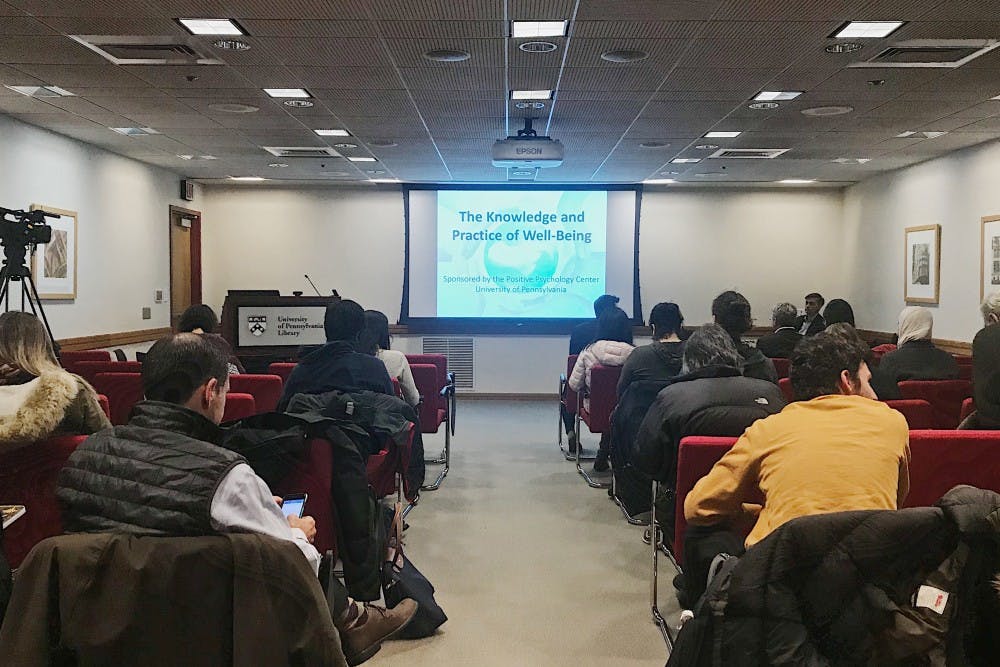
Penn Program for Flourishing co-founders Faisal Khan and 2014 College graduate Laura Taylor presented on how positive psychology-based programming can benefit students at an Penn's Teach-In on March 20.
Credit: Biruk TibebeThe Penn Program for Flourishing is an eight-week workshop that helps students thrive with the tools of positive psychology.
PP4F is a recent program that connects Penn students with mentors, including graduate students of the Master in Applied Positive Psychology at Penn, in weekly meetings that focus on wellness and building on one's own strengths.
The founder of PP4F, Faisal Khan, is a 2011 Engineering and Wharton and 2017 Arts and Sciences graduate of MAPP. His collaborator in the program, 2014 Arts and Sciences graduate Laura Taylor, also graduated from the MAPP program.
“We align the students with mentors who can talk to students about the skills learned in the workshops, or about life in general,” Khan said. “The mentors, by virtue of experience can give some good guidance to the students.”
Their exercises are based on the application of positive psychology theories, a field described as the science of human flourishing.
“I have always seen the need both in the corporate world and outside of the corporate world for positive psychology to help live a life of well-being,” Khan said. “Positive psychology provides us with a solution as to how we can be more engaged at work, how to avoid being burnt out, how we can get fulfillment from the work that we do, and so that’s exactly what we’re trying to bring to the students here at the Penn community.”
Susie Patterson, a MAPP student and a mentor at PP4F, emphasized the applicable nature of the material taught in the workshop.
“We rarely start with a positive psychology topic. We start with a life situation and then talk through it, pulling from positive psychology when it is helpful,” Patterson said. “This process allows us to not conform to a scientific approach, but rather use the science to support real life.”
Henry Edwards, also a mentor and MAPP student, agrees on how applicable positive psychology can be. “We apply things like mindfulness and gratitude exercises, also using tools from cognitive behavioral therapy like reframing,” he said. “With everyone I work with, there's a feeling that these are really applicable tools for anyone.”
The program is open to all Penn students, both undergraduates and graduates, with no selective application process. According to Khan, around 20 students attend the workshops each semester, with participation growing since its beginning in 2017. Its fourth iteration will take place next semester.
Khan and Taylor run this program separately in their own time, outside of their jobs, and they believe more funding would better support PP4F.
“This program cannot run forever on a voluntary basis,” Khan said. “I have a hard time reaching out to a funder at the university to make this a permanent, sustainable initiative that’s available to a lot more students than it currently is.”
Despite being one of the only Ivy League institutions with a Positive Psychology Center, Penn undergraduates do not have access to the same large-scale classes in the field. Positive psychology classes at Harvard University and Yale University prove to be their most popular class among students.
Penn’s Psychology Department offers courses in abnormal psychology and positive psychology to undergraduates, but they are not as large as those offered at Yale or Harvard. Abnormal psychology, for instance, was capped at 120 students this semester.
Khan said he believes the program is potentially “even better” than a positive psychology course at Penn.
“The Penn Program for Flourishing is not a for-credit workshop, so it’s something the students are motivated on their own to do, something that the students say ‘yes’ to intrinsically,” Khan said.
College junior Vikki Kalbacher, who is enrolled in the current spring semester workshop, said the program is something she looks forward to every week.
“I don't have to worry about judgment in that room,” she said. “Usually I get really anxious working with people I don't know well, especially when some of the content we engage with may be a bit more personal than content we discuss in an academic setting, but again, every one there is very trustworthy and I feel completely comfortable in the space.”
College senior Meghana Reddy added that attending the workshop helped her recognize her own values and strengths. “At Penn in general we don't really get to take classes where we learn about things introspectively,” she said. “I talk to my mentors and it helps me understand myself better, kind of like becoming more aware of yourself.”
Even though PP4F focuses on wellness, it does not have connections with Penn's Counseling and Psychological Services. However, Taylor and Khan both underlined CAPS’ importance. “Their services are deeply valuable and necessary,” Taylor said. “PP4F is designed to align with their efforts to enhance and cultivate mental and emotional well-being on campus.”
“The University of Pennsylvania has a unique opportunity to become a leader in student well-being,” Taylor added. “The strengths, network, resources, and research of positive psychology are here to help, and the PP4F hopes to be a supportive part of the campaign for wellness on campus.”
The Daily Pennsylvanian is an independent, student-run newspaper. Please consider making a donation to support the coverage that shapes the University. Your generosity ensures a future of strong journalism at Penn.
Donate




